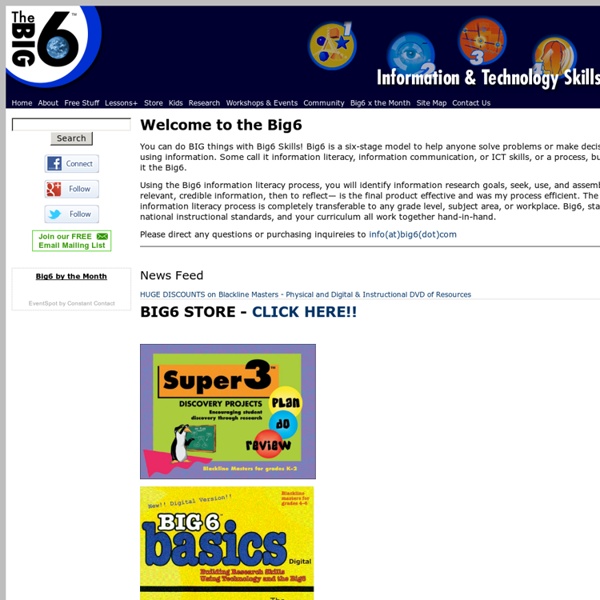



UDL Toolkits: enseñando a todo estudiante d Model of the Internet Inquiry Process This toolkit was made possible by a grant funded by the U.S. Department of Education, Office of Special Education Programs, Grant Award #H324N010005. What is the Internet inquiry toolkit? The Internet Inquiry Toolkit is a resource for language arts, content area, and special education teachers (grades 5-10) who recognize that finding information on the Internet has become an essential literacy task for today's students. What can I do here? Learn about the Internet Inquiry process from a Universal Design for Learning (UDL) perspective Follow procedures for teaching Internet inquiry strategies Access resources to use in your classroom Find out how others have integrated Internet Inquiry strategies into their curricula What Does The Toolkit Include? ProceduresThe steps and key UDL-based concepts of this toolkit.
Alfabetización Informacional del sitio web »SCONUL siete pilares de la alfabetización informacional In 1999, The SCONUL Working Group on Information Literacy published “Information skills in higher education: a SCONUL position paper” (SCONUL, 1999), introducing the Seven Pillars of Information Skills model. Since then, the model has been adopted by librarians and teachers around the world as a means of helping them to deliver information skills to their learners. In 2012 the model was updated and expanded to reflect more clearly the range of different terminologies and concepts which we now understand as “Information Literacy”. In order for the model to be relevant to different user communities and ages, the new model is presented as a generic “core” model for Higher Education, to which a series of “lenses”, representing the different groups of learners, can be applied. In the 21st century, information literacy is a key attribute for everyone, irrespective of age or experience. SCONUL Seven Pillars of Information Literacy: Core Model Lenses:
Guidelines on Information Literacy for Lifelong Learning by Jesús Lau Final Draft These guidelines have been compiled by the Information Literacy Section (InfoLit) of IFLA with the aim of providing a pragmatic framework for those professionals who need or are interested in starting an information literacy program. The guidelines will aid information professionals engaged in educational programs, i.e., basic and higher education, in their efforts to meet their current information needs. However, most of the concepts, principles and procedures can be applied with minimal adaptation to any library setting. Information professionals working in all types of libraries should have as one of their main institutional goals the facilitation of users’ efforts to acquire information competencies. Electronic Versions Original Language English Translations
Guidelines & Standards | Association of College and Research Libraries (ACRL) ACRL is the source that the higher education community looks to for Standards, Guidelines, and Frameworks on academic libraries. ACRL develops Standards, Guidelines, and Frameworks to help libraries, academic institutions, and accrediting agencies understand the components of an excellent library. These Standards, Guidelines, Frameworks, and model statements are reviewed and updated by the membership on a regular basis. The ACRL Guide to Policies and Procedures contains complete information on the creation and review of ACRL Standards, Guidelines, and Frameworks. ACRL’s Standards, Guidelines, and Frameworks are provided as a free resource to the academic library community. Your donation to the ACRL Advancement Fund, which supports initiatives that strengthen ACRL’s influence in higher education and its ability to create diverse and inclusive communities in the association and the profession, assists us as we continuing to provide these important resources.